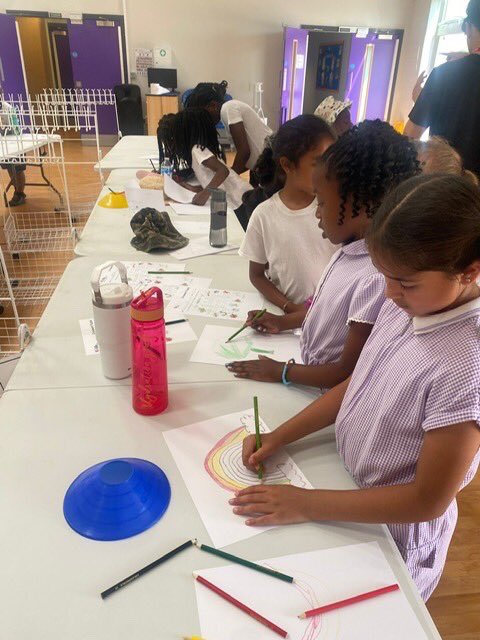English and Literacy
English and Literacy
Intent: Introduction, Vision and Philosophy
The purpose of this document is to clarify the ‘how, why, and what’ of English teaching at Harris Primary Academy Mayflower. This is to be used by staff to clarify expectations, highlight the resources that we have at our disposal, and to ensure that a high-quality English curriculum is being taught to all. At Mayflower, we want to ensure that our children will make a profound, positive impact to the outcomes of every child. The importance of being literate has never been more important in our society, and those who struggle to read and write are at a catastrophic disadvantage. Studies show that children who leave primary school able to read and write, are much more likely to be successful in later life.
At Harris Primary Academy Mayflower, we are not just attempting to teach the fundamental skills and knowledge so that our children are capable; we are aiming to instil in them a love of independently pursuing their development of literacy. We aim to create life-long readers, who engage in a wide range of books for both information and pleasure, who are able to apply their skills and learning into other areas of their lives and education.
Staff receive regular CPD on the teaching and planning of English within school, and take part in the continual moderation and assessment of writing.
Implementation: What does English look like at HPAMA? Overview:
At HPAMA we teach English every day, along with separate handwriting, phonics and comprehension lessons. This ensure that children have a suitable level of exposure to all areas of the English curriculum. Weekly English homework is also sent home with age-appropriate spellings to be learned, aiding the development of their vocabulary.
Each child will receive a Reading Record at the beginning of the year, where they will keep a written record of their reading with adults outside of school. Children are encouraged to read at home every day and also bring their reading books to school every day in order to take advantage of reading at any opportunity.
Every class should be rich in language, speaking and listening, with a culture of children reading in lessons at every opportunity (from the board, reading questions aloud etc.). Teachers will at all times model the correct spoken language of English along with the standard of handwriting expected while both writing on the board and in class marking.
Approach to Teaching Reading and Phonic Skills.
We are really proud to be a Ruth Miskin Model School for Phonics which is a great honour! This award recognises excellence in teaching and excellence in outcomes for children. We use the Read Write Inc. phonics scheme across our academy. Read Write Inc. is a phonics programme, for 4 to 7 year olds learning to read and write. Children are placed into homogenous reading ability sets and then learn various phonemes (segments of sound) and the corresponding grapheme i.e. how that sound is written. Sounds are divided into 3 sets. In Reception children will learn Set 1 sounds and some Set 2 sounds; in Years 1 and 2 (Key Stage 1), children will secure Set 2 sounds and learn new Set 3 sounds.
The programme involves specific terminology which your child may talk about when they come home:
• Fred the Frog: Fred the Frog is a frog which is used as a vehicle to help the children blend sounds. Children learn pure sounds first but then need to learn to blend sounds together so that they can read a word. Fred can only read pure sounds, so the children help Fred by blending the sounds so that they can help him to read a whole word!
E.g. c -a - t sounds out as cat. ‘c- a- sh’ has three sounds which make the word ‘cash’.
• Green Words - these are words which can be read phonetically
• Red Words – these are words which cannot be read phonetically.
Teachers read aloud to children every day which develops their listening and comprehension skills. Our aim is to develop a passion and a love for reading high quality texts in our children.
Typical Weekly Overview
Each English Lesson is to be differentiated in several different ways in order to ensure that all children are able to access the learning of the curriculum and are suitably challenged in respect to their own abilities. For every lesson, children will answer a purple pen question, which will aim to check understanding, consolidate learning or challenge the children into thinking outside of their usual parameters.
The first lesson of each week will focus on vocabulary, grammar and punctuation, aiming to give the children a broad exposure to the different areas of the English curriculum, which will also aid the development of their writing.
The rest of the week will focus on a particular class book, which will have been carefully selected for its high-quality and engaging content and vocabulary. Children will embark on a journey of learning through each text, completing a wide range of tasks to enable coverage and mastery of the curriculum.
At the end of each week, every child will have the opportunity to complete an extended piece of writing, which must be scaffolded and presented to them in a way that is both engaging and challenging. Children will have a list of age-appropriate writing targets to be achieved over the course of the year, which can help to contribute towards teacher assessment of writing within the age-appropriate level.
Impact
The impact on our children is clear: progress, sustained learning and transferrable skills. With the implementation of the writing journey being well established and taught thoroughly in both key stages, children are becoming more confident writers and by the time they are in upper Key Stage 2, most genres of writing are familiar to them and the teaching can focus on creativity, writer’s craft, sustained writing and manipulation of grammar and punctuation skills.
Children will be given continuous opportunities to develop their reading, writing, speaking and listening across all areas of the curriculum. We aim that, by the time our children have left our care, that they have developed a love of reading along with a strong foundation of writing, so that they are equipped to apply these skills to any area of their lives. We aim to provide all children, regardless of their backgrounds, with the necessary tools to excel.
Jemma McCarthy (Phonics), Steven Nicholas (Comprehension), Michael Osei-Saahene (English)
English Team



























